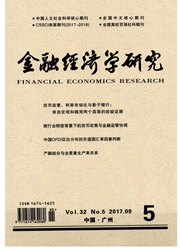

 中文摘要:
中文摘要:
基于Hansen面板门槛模型,利用中国1996~2008年间30个省(市、区)的相关数据,进行了房地产财富效应的非线性检验。研究发现,从房价增长率和收入增长率来看,房价上涨对消费的影响存在着显著的单门槛效应,呈现非线性的区制变化,尽管总体上房价上涨不利于促进消费,但是在不同类型的区制,对消费的抑制程度存在着明显的差异。建议针对中国不同类型的区域,平抑房价的方式应有所区别,以减少可能出现的市场风险。
 英文摘要:
英文摘要:
As the traditional linear assumption neglects the instability of real estate wealth effect, there is no consistent conclusion from the result about it. This paper gives a depth analysis of the consumer' s intertemporal choice model including the real estate wealth using Hansen panel threshold model to conduct the non-linear test of real estate wealth effect on the data of China' s 30 provinces ( municipality and autonomous region) from 1996 to 2008. As a result, according to the housing price and income growth rate, we can see that the significant single threshold effect of real estate price exists in the effect to the consumption. And it also shows non-linear changes of regimes. Although real estate price increase can not contribute to raising consumption, the degree of restraining consumption is varying significantly in different regimes. Our empirical results suggest that different methods of restraining real estate price should be carried on in different regions of china accordingly in order to reduce the potential market risk.
 同期刊论文项目
同期刊论文项目
 同项目期刊论文
同项目期刊论文
 期刊信息
期刊信息
